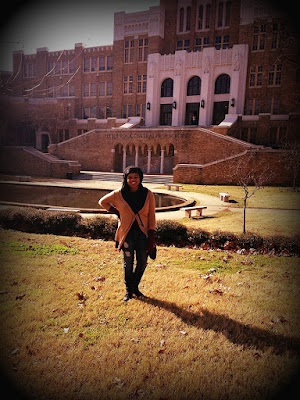 On December 16th, 2015, I went on a trip to
Little Rock, Arkansas. While I was there, I was able to tour Little Rock
Central High School. The first stop on the tour was the outside of the
facility. I arrived at Little Rock Central High School at approximately 1:07
PM, just as students were being let out for their Winter break. The building
was absolutely beautiful.
On December 16th, 2015, I went on a trip to
Little Rock, Arkansas. While I was there, I was able to tour Little Rock
Central High School. The first stop on the tour was the outside of the
facility. I arrived at Little Rock Central High School at approximately 1:07
PM, just as students were being let out for their Winter break. The building
was absolutely beautiful.
It amazed that I was standing there in 2015, watching
students who identified with various racial groups interacting with one another.
Of course, I see diverse groups interacting all of the time…but in that moment,
I was reminded of the segregation and hatred that occurred at that very same
high school (and other high schools across the nation). I learned that there
were many other students who had signed up to be the first black students to
attend Little Rock Central High School. However, many had parents who were
reluctant and decided not to let their children attend. Black students were
told they could not retaliate verbally or physically if verbally or physically
assaulted by White students. Failure to comply would result in immediate
suspension.
The first notable item inside the building is a showcase
dedicated to the Little Rock Nine. Inside the showcase was a collection of books,
autobiographies, and miniature replicas of clothing items dedicated to Ernest
Green, Carlotta Walls LaNier, Minnijean Brown, Gloria Ray Karlmark, Thelma
Mothershed, and Melba Pattillo Beals. I was then escorted inside the remainder
of the building.
I toured the auditorium next, and I could not believe my
eyes. The auditorium, although dated, was extremely large. I could still see
underneath the seats where there used to be under seat air conditioning. The
next stop was the cafeteria, where I heard the story of “The great chili
incident”, in which Minnijean Brown was suspended for spilling chili on a white
student. Controversy still exists as to whether Minnijean spilled the chili on
purpose. Nonetheless, Minnijean was eventually suspended.
The next stop was a small courtyard outside. I was told that
Ernest Green, the only one of the Little Rock Nine to graduate from the high
school, was not allowed to graduate with any white students. He had his
graduation ceremony outside, and was surprised when Dr. Martin Luther King, Jr.
showed up at his graduation. There I was, at 21 years old, learning new details
about an event that happened in a country I have been living in my entire life.
How was this possible?
As I left the building, I was able to view a section that
was created to commemorate the Little Rock Nine. In this structure were two
very large collages of photos, as well as a recreation of the statues above the
doors. However, these statues differed from the statues in the front because
they exhibited Black facial features. It was interesting to see that something
so subtle as a statue could make such a bold statement. I was very honored to
have been able to go on this trip and walk on the same campus that the Little
Rock Nine had.
“Learning history is
easy; learning its lessons seems almost impossibly difficult.” – Nicolas Bently
Written by: Randi Morgan

No comments:
Post a Comment